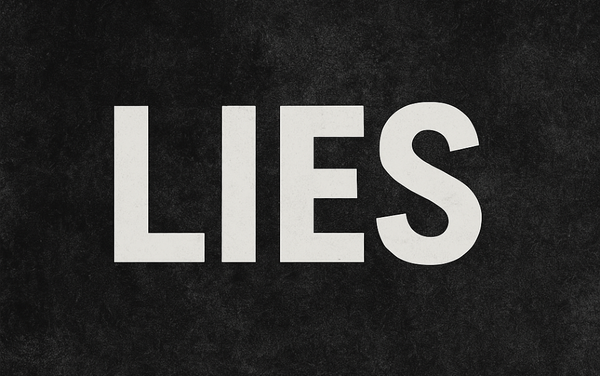The Catch-22 of Having a Sensitive Conscience
Do you ever feel like your conscience leads you astray? Do you struggle to discern between God's voice and the voice of the enemy? You're not alone.

Do you know the origin of the phrase “Catch-22”? The term came from Joseph Heller’s 1961 novel Catch-22, which satirizes the absurdities of war and military bureaucracy. In the story, the “catch” is a contradictory rule that traps U.S. Army Air Force pilots into flying endless missions with no reprieve. It specified that “A concern for one's safety in the face of dangers that were real and immediate was the process of a rational mind.”
A pilot might indeed be crazy and should be grounded. However, if he asked, this was evidence that he was indeed sane, and he would be forced to fly more missions. According to the catch, a pilot “would be crazy to fly more missions and sane if he didn't, but if he was sane he had to fly them. If he flew them he was crazy and didn't have to; but if he didn't want to he was sane and had to.”[1]
Yes, my mind is spinning too, and it brings to mind a different version of Catch-22, which I’ve experienced in my Christian journey.

My Catch-22
I’ve always had what some might call a “sensitive conscience.” To this day, if I cuss, I text an accountability buddy and ask him to pray for me. If I gossip, I try to circle back and apologize. If I feel like there is a misunderstanding on a contract, I’ll give back money even if I think it was 95% the other person’s fault. This is the positive side of having a sensitive conscience, and it’s one I don’t want to lose.
But there is a downside. It also means I struggle to change. By nature, I’m slow to buy in but fiercely loyal when I do. This applies to relationships, organizational vision statements, and beliefs. I’ll give you an example. Growing up in a very conservative Christian upbringing, there was a high emphasis on external lifestyle choices, and these ideals shaped my conscience.
But in my early twenties, when I dug deeper into Scripture and listened to other voices outside my context, I realized that my growing understanding of Scripture didn’t match the way I lived. However, I quickly felt stuck in a Catch-22 scenario, and here’s why.
I remember hearing a Christian speaker talk on Romans 14:22-23, which says, 22 “Whatever you believe about these things, keep between yourself and God. Blessed is the one who does not condemn himself by what he approves. 23 But whoever doubts stands condemned if he eats, because his eating is not from faith, and everything that is not from faith is sin.”
According to this speaker’s interpretation of the passage, if your conscience felt hesitant about making a decision or a change, you were wrong to make it. This message stuck with me and almost paralyzed my spiritual growth journey because I wasn’t sure what to do. If I didn’t change, I didn’t feel I was obeying God’s Word. But if I did change and didn’t feel total peace (something I’ve now discovered is nearly impossible to have after you’ve lived one way for many years), I was disobeying the voice of the Spirit.
Catch-22.
Here's Why I Share This Story
Like me, if you were raised in a Christian setting, chances are you’ve adopted some beliefs that need to be challenged. But the more I’ve talked to Christians from all different backgrounds, the more I continue to see this Catch-22 show up in many different forms.
- My Anabaptist Christian friends can’t see how any Christian could honestly read Matthew 5 and still go to war.
- Some of my more liturgical friends couldn’t imagine going to a church where there is a whole band and worship team on stage.
- A few of my more progressive Christian friends couldn’t picture a Christian who would vote for Trump, and some of my more conservative friends couldn’t understand a Christian who wouldn’t.
So, what are we to do? How do we make changes when doing so causes us discomfort and our conscience screams at us to do nothing? How do we be "transformed by the renewing of our minds" (Romans 12) when our transformation journey is often so powerfully shaped by cultural preferences?
Here’s what I think most Christians do. There comes a point in their lives (I think it often happens in their thirties, especially if they have young kids) when they get tired of having their beliefs challenged. They rightly value the stability of being a person who is consistent, but they wrongly err in thinking this means they should never change. They've seen others who have, and it hasn't turned out good. So they dig in their heels and double down, equating discomfort with the voice of the enemy.
Perhaps you know what I'm talking about and feel caught in your own mental Catch-22 today. You know there is an area of your thinking that needs to change, but you feel stuck. If this is you, here are a few steps I’d recommend to help you break free of this mental trap.
Step 1: Develop a Holistic Framework of God’s Word.
Many Christians build their “third tier” ideals based on one or two controversial passages, all while ignoring the greater meta-narrative of Scripture. This is dangerous and often leads to believing things that work well in one context but don’t travel well to others. Seek to know the "whole plan of God" (Acts 20:27).
Step 2: Sit At the Table of Christians Who Think Differently Than You.
Don’t sit to convert. Don’t sit to judge. But sit to understand and honestly allow your beliefs to be challenged. Don’t just read books and interact with others at a distance while maintaining your Christian bubble. Step out of your context and visit churches outside your tradition. Don’t just learn the arguments other groups have—learn the nitty gritty ways their beliefs shape how they are becoming more like Christ (a key difference) and be sharpened by them (Pro. 27:17).
Step 3: Make Decisions with Purposeful, Prayerful, Boldness.
I’ll give you a practical example. For years, I fell into the complementarian category and felt it was unbiblical for women to be pastors. But little by little, people like my friend Tina Pitamber and a conversation with Nijay Gupta shifted my perspective. Despite these conversations, the first time I heard a woman preach from a stage felt very weird. But now, I’m so thankful I made that change, and it’s allowed me to learn from many amazing women I would have previously not heard.
Now, convinced as I am about some of my current beliefs, here is the crazy part—there is a very good chance I’m wrong or misguided on many of them.
As Christians, we like things black and white. And thankfully, the core of the gospel is very black and white. But outside of the big things in Scripture, there is an awful lot of gray, and my encouragement to you is not to allow a Catch-22 situation to keep you from becoming more like Christ.
Christlikeness requires change—sometimes very uncomfortable change. The person you are today should not be the person you were yesterday, and with God’s grace, should not be the person you are tomorrow. So embrace the process "so that your progress may be evident to all." (1 Tim. 4:15)
[1] Joseph Heller, Catch-22 (New York: Simon and Schuster, 1961).





